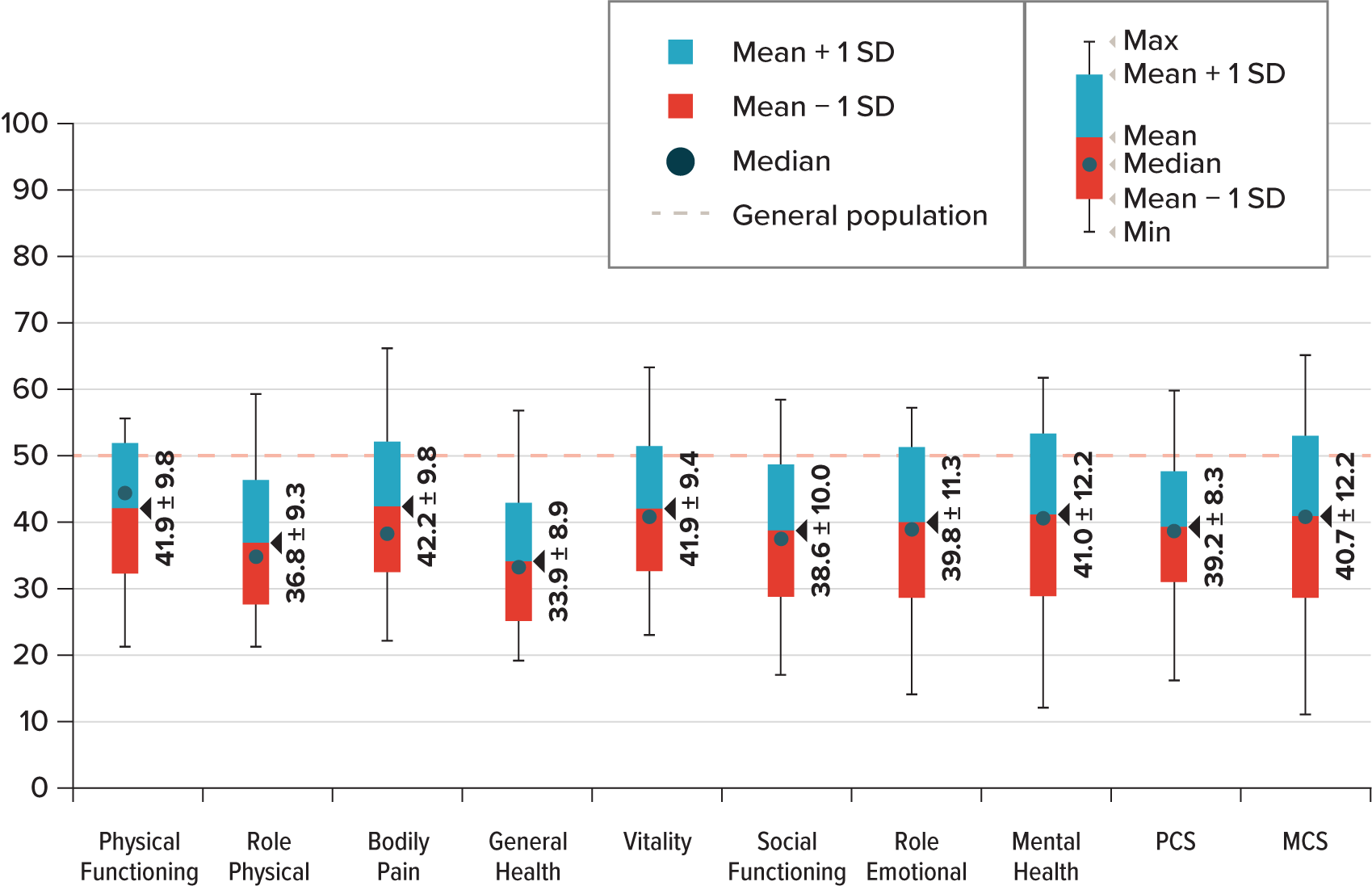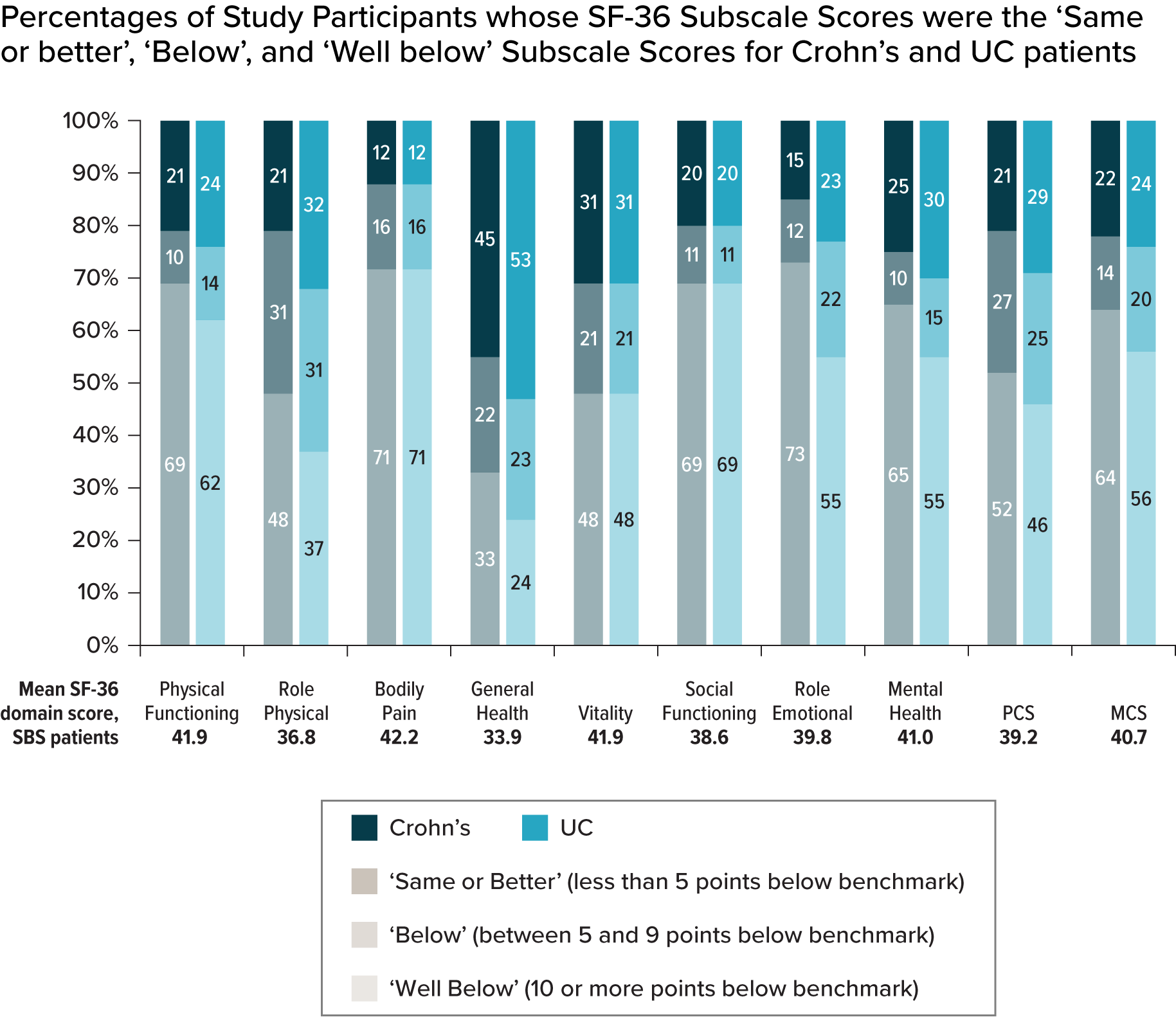Monday Poster Session
Category: Small Intestine
P4043 - Impaired Health-Related Quality of Life in Patients With Short Bowel Syndrome Dependent on Parenteral Support: Results From a Multinational Survey
Monday, October 27, 2025
10:30 AM - 4:00 PM PDT
Location: Exhibit Hall

Syed-Mohammed Jafri, MD (he/him/his)
Henry Ford Health
Detroit, MI
Presenting Author(s)
Marion F.. Winkler, PhD, RD1, Jenny E.. Harrison, MS2, Roopa Vemulapalli, MD3, Vanessa J.. Kumpf, PharmD4, Gail Mitchell, MBA5, Daniel Wolin, BS6, Laurie Zografos, BS7, Mindy Yang, PharmD8, Laurin Jackson, MA7, Jinyi Wang, MS9, Jeff Henderson, BA10, Mena Boules, MD11, Syed-Mohammed Jafri, MD12
1Rhode Island Hospital, Providence, RI; 2Girls With Guts, Turners Falls, MA; 3University of Texas Southwestern Medical Center, Dallas, TX; 4Vanderbilt University Medical Center, Nashville, TN; 5Ironwood Pharmaceuticals, Walchwil, Zug, Switzerland; 6RTI-Health Solutions, Marshall, MI; 7RTI Health Solutions, Research Triangle Park, NC; 8Ironwood Pharmaceuticals, Mount Pocono, PA; 9RTI-HS, Research Triangle Park, NC; 10Ironwood Pharmaceuticals, Jupiter, FL; 11Ironwood Pharmaceuticals, Inc., Boston, MA; 12Henry Ford Health, Detroit, MI
Introduction: Short bowel syndrome (SBS) is a debilitating condition associated with substantial changes in health-related quality of life (HRQoL). Many patients with SBS require chronic parenteral support (PS), including total parenteral nutrition and/or intravenous hydration to maintain health and survival. This study evaluated HRQoL in adults with SBS dependent on PS using the acute version of the SF-36 Health Survey (SF-36v2).
Methods: As part of a noninterventional, cross-sectional, online survey, SF-36v2 scores were collected from adults with SBS dependent on PS in the United States (US) and Europe. Survey participants’ norm-based SF-36v2 scores were compared with mean scores of the general US population (mean, 50.0; standard deviation [SD], ±10.0) and populations with Crohn’s disease and ulcerative colitis (UC).
Results: 91 patients participated (50 from the US; 41 from Europe); 69.1% were White, 58.2% were female, and the mean age was 50.4 (range: 24-73) years. Mean Physical (39.2±8.3) and Mental (40.7±12.2) Component Summary scores (Figure 1) were approximately 1 SD below the general US population-based mean. All SF-36v2 domains reflected substantial impairments, particularly the General Health (33.9±8.9) and Role Physical (36.8±9.3) domains. Compared with populations with Crohn’s disease and UC, around 50% of patients with SBS scored “below” or “well below” the norms for the domains of General Health, Role Physical, and Vitality (Figure 2).
SF-36v2 item-level data revealed that more than 90% of patients reported accomplishing less or spending less time on work/daily activities due to their physical health. More than 90% reported limitations with vigorous activities, and 78.9% reported limitations with moderate activities. Most patients reported feeling worn out (96.7%), with 46.6% feeling this way “most” or “all” of the time, and 36.3% reported that their physical or emotional health interfered with social activities “most” or “all” of the time.
Discussion: Adults with SBS dependent on PS experience broad functional impairment in HRQoL. Mean scores were lower than general population means across all SF-36v2 domains and were lower than those of patients with Crohn’s disease and UC for the General Health, Role Physical, and Vitality domains. These findings underscore the extensive impact of SBS and PS on physical, emotional, and social well-being, reinforcing the urgent need for therapies that address the multidimensional burden of this condition.

Figure: Figure 1. SF-36 norm-based scores
MCS, Mental Component Summary; PCS, Physical Component Summary
Note: For each domain and component summary, higher scores indicate better health status

Figure: Figure 2. Comparison of SF-36 scores between patients with SBS, Crohn’s disease, and UC
MCS, Mental Component Summary; PCS, Physical Component Summary
Disclosures:
Marion Winkler: American Regent – Consultant. Ironwood Pharmaceutical – Consultant. Takeda Pharmaceutical – Consultant.
Jenny Harrison indicated no relevant financial relationships.
Roopa Vemulapalli indicated no relevant financial relationships.
Vanessa Kumpf: American Regent – Consultant. Baxter Healthcare – Consultant. Fresenius Kabi – Consultant. VectivBio (now Ironwood) – Consultant.
Gail Mitchell: ironwood pharmaceuticals – Consultant.
Daniel Wolin indicated no relevant financial relationships.
Laurie Zografos indicated no relevant financial relationships.
Mindy Yang: Ironwood Pharmaceuticals – Consultant.
Laurin Jackson indicated no relevant financial relationships.
Jinyi Wang indicated no relevant financial relationships.
Jeff Henderson: Ironwood Pharmaceuticals – Employee.
Mena Boules: Ironwood Pharmaceuticals, Inc (Previously VectivBio) – Employee, Stock-publicly held company(excluding mutual/index funds).
Syed-Mohammed Jafri: Abbvie – Speakers Bureau. Gilead – Speakers Bureau. Intercept – Speakers Bureau. Ironwood – Speakers Bureau. Takeda – Speakers Bureau.
Marion F.. Winkler, PhD, RD1, Jenny E.. Harrison, MS2, Roopa Vemulapalli, MD3, Vanessa J.. Kumpf, PharmD4, Gail Mitchell, MBA5, Daniel Wolin, BS6, Laurie Zografos, BS7, Mindy Yang, PharmD8, Laurin Jackson, MA7, Jinyi Wang, MS9, Jeff Henderson, BA10, Mena Boules, MD11, Syed-Mohammed Jafri, MD12. P4043 - Impaired Health-Related Quality of Life in Patients With Short Bowel Syndrome Dependent on Parenteral Support: Results From a Multinational Survey, ACG 2025 Annual Scientific Meeting Abstracts. Phoenix, AZ: American College of Gastroenterology.
1Rhode Island Hospital, Providence, RI; 2Girls With Guts, Turners Falls, MA; 3University of Texas Southwestern Medical Center, Dallas, TX; 4Vanderbilt University Medical Center, Nashville, TN; 5Ironwood Pharmaceuticals, Walchwil, Zug, Switzerland; 6RTI-Health Solutions, Marshall, MI; 7RTI Health Solutions, Research Triangle Park, NC; 8Ironwood Pharmaceuticals, Mount Pocono, PA; 9RTI-HS, Research Triangle Park, NC; 10Ironwood Pharmaceuticals, Jupiter, FL; 11Ironwood Pharmaceuticals, Inc., Boston, MA; 12Henry Ford Health, Detroit, MI
Introduction: Short bowel syndrome (SBS) is a debilitating condition associated with substantial changes in health-related quality of life (HRQoL). Many patients with SBS require chronic parenteral support (PS), including total parenteral nutrition and/or intravenous hydration to maintain health and survival. This study evaluated HRQoL in adults with SBS dependent on PS using the acute version of the SF-36 Health Survey (SF-36v2).
Methods: As part of a noninterventional, cross-sectional, online survey, SF-36v2 scores were collected from adults with SBS dependent on PS in the United States (US) and Europe. Survey participants’ norm-based SF-36v2 scores were compared with mean scores of the general US population (mean, 50.0; standard deviation [SD], ±10.0) and populations with Crohn’s disease and ulcerative colitis (UC).
Results: 91 patients participated (50 from the US; 41 from Europe); 69.1% were White, 58.2% were female, and the mean age was 50.4 (range: 24-73) years. Mean Physical (39.2±8.3) and Mental (40.7±12.2) Component Summary scores (Figure 1) were approximately 1 SD below the general US population-based mean. All SF-36v2 domains reflected substantial impairments, particularly the General Health (33.9±8.9) and Role Physical (36.8±9.3) domains. Compared with populations with Crohn’s disease and UC, around 50% of patients with SBS scored “below” or “well below” the norms for the domains of General Health, Role Physical, and Vitality (Figure 2).
SF-36v2 item-level data revealed that more than 90% of patients reported accomplishing less or spending less time on work/daily activities due to their physical health. More than 90% reported limitations with vigorous activities, and 78.9% reported limitations with moderate activities. Most patients reported feeling worn out (96.7%), with 46.6% feeling this way “most” or “all” of the time, and 36.3% reported that their physical or emotional health interfered with social activities “most” or “all” of the time.
Discussion: Adults with SBS dependent on PS experience broad functional impairment in HRQoL. Mean scores were lower than general population means across all SF-36v2 domains and were lower than those of patients with Crohn’s disease and UC for the General Health, Role Physical, and Vitality domains. These findings underscore the extensive impact of SBS and PS on physical, emotional, and social well-being, reinforcing the urgent need for therapies that address the multidimensional burden of this condition.

Figure: Figure 1. SF-36 norm-based scores
MCS, Mental Component Summary; PCS, Physical Component Summary
Note: For each domain and component summary, higher scores indicate better health status

Figure: Figure 2. Comparison of SF-36 scores between patients with SBS, Crohn’s disease, and UC
MCS, Mental Component Summary; PCS, Physical Component Summary
Disclosures:
Marion Winkler: American Regent – Consultant. Ironwood Pharmaceutical – Consultant. Takeda Pharmaceutical – Consultant.
Jenny Harrison indicated no relevant financial relationships.
Roopa Vemulapalli indicated no relevant financial relationships.
Vanessa Kumpf: American Regent – Consultant. Baxter Healthcare – Consultant. Fresenius Kabi – Consultant. VectivBio (now Ironwood) – Consultant.
Gail Mitchell: ironwood pharmaceuticals – Consultant.
Daniel Wolin indicated no relevant financial relationships.
Laurie Zografos indicated no relevant financial relationships.
Mindy Yang: Ironwood Pharmaceuticals – Consultant.
Laurin Jackson indicated no relevant financial relationships.
Jinyi Wang indicated no relevant financial relationships.
Jeff Henderson: Ironwood Pharmaceuticals – Employee.
Mena Boules: Ironwood Pharmaceuticals, Inc (Previously VectivBio) – Employee, Stock-publicly held company(excluding mutual/index funds).
Syed-Mohammed Jafri: Abbvie – Speakers Bureau. Gilead – Speakers Bureau. Intercept – Speakers Bureau. Ironwood – Speakers Bureau. Takeda – Speakers Bureau.
Marion F.. Winkler, PhD, RD1, Jenny E.. Harrison, MS2, Roopa Vemulapalli, MD3, Vanessa J.. Kumpf, PharmD4, Gail Mitchell, MBA5, Daniel Wolin, BS6, Laurie Zografos, BS7, Mindy Yang, PharmD8, Laurin Jackson, MA7, Jinyi Wang, MS9, Jeff Henderson, BA10, Mena Boules, MD11, Syed-Mohammed Jafri, MD12. P4043 - Impaired Health-Related Quality of Life in Patients With Short Bowel Syndrome Dependent on Parenteral Support: Results From a Multinational Survey, ACG 2025 Annual Scientific Meeting Abstracts. Phoenix, AZ: American College of Gastroenterology.
